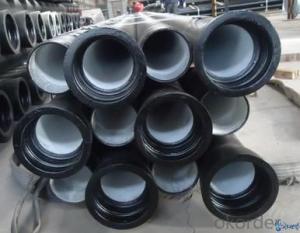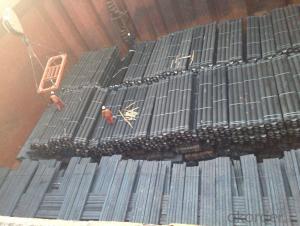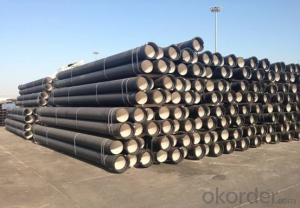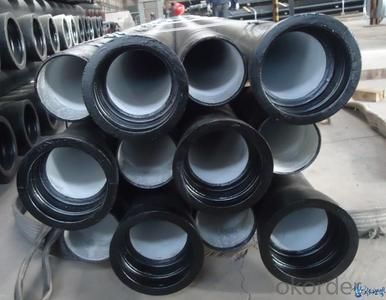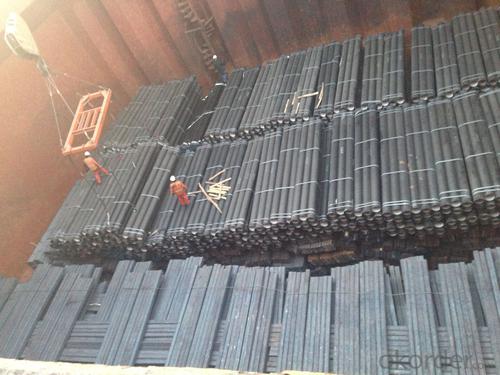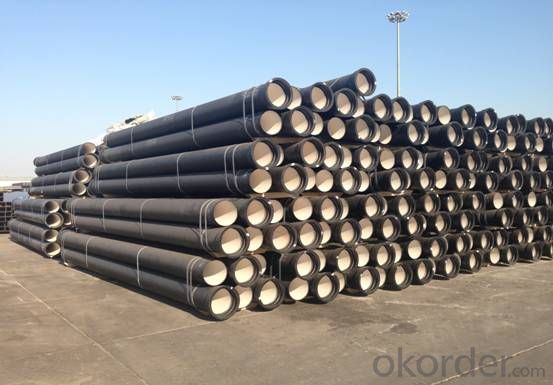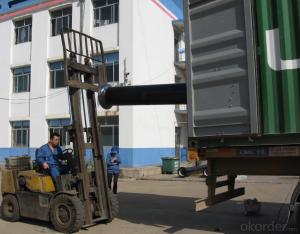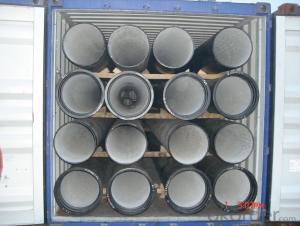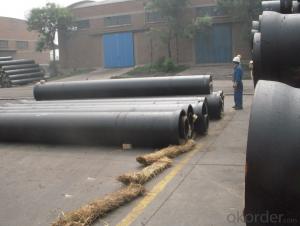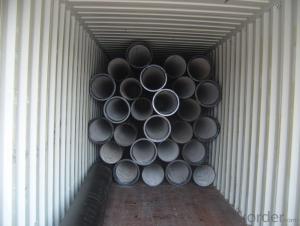DUCTILE IRON PIPES K8 DN150
- Loading Port:
- China Main Port
- Payment Terms:
- TT OR LC
- Min Order Qty:
- -
- Supply Capability:
- -
OKorder Service Pledge
OKorder Financial Service
You Might Also Like
Ductile Iron Cast Pipe is without any defects compare with tradition casting tech, which has many advantages particularly as follow:
(1) High density. In the "vertical upward casting" process, the melt iron of centre liquid column in center crystallizer is continuously feeding for volume shrinkage caused by condensation tube at outer circumference , which lead to be free of shrinkage porosity.
(2) High purity. When melt iron pouring, the mixed impurities such as gas, dross, sand grain which are lighter than melt iron could be eliminated at furnace mouth, its impossible to enter into the crystallizer through the channel, so the melt iron into the crystallizer is very pure.
(3) Strength with toughness. The cooling speed provided by continuous crystallizer is 30 times than sand casting and 5 times than centrifugal casting, and doesn't produce white iron, the eutectic cell volume of continuous cast iron is one eighth to one tenth compare with traditional cast iron. The density of graphite nodule in ductile iron can reach 300-700 pcs/mm2. Therefore, all reason above improve the strength and toughness of continuous cast iron.
(4) Free machining. The high speed cooling make the hardening phase (such as boride, steadite) not appear like reticular, massive or thick, but diffuse like fish bone and pane in shape, moreover, there are tiny graphite flakes inlaid hardening phase. It's free machining in BrinellHardness the range of 250-300HB. However, the Brinell Hardness of 250 is top limit to common metal materials.
(5) Uniform composition of tube wall. The convection mixing of liquid column caused by marching type drawing in crystallizer make the composition of tube wall well-distributed, and concentration gradient very little.
(6) High productivity. To the wall thickness of tube under 10mm, the speed of continuous casting is 1 meter/min, to the wall thickness of tube under 20mm, the speed of continuous casting is 0.5 meter/min, which is high efficiency that centrifugal or other casting tech couldn't reach.
- Q: What are the different pressure classes available for ductile iron pipe?
- The different pressure classes available for ductile iron pipe include Class 100, Class 150, Class 200, Class 250, Class 300, Class 350, and Class 400.
- Q: How do ductile iron pipes handle thermal expansion and contraction?
- Ductile iron pipes are known for their excellent ability to handle thermal expansion and contraction. This is mainly due to their unique composition and design which allows them to withstand changes in temperature without experiencing significant damage or deformation. Thermal expansion occurs when a material expands due to an increase in temperature, while thermal contraction refers to the contraction that occurs when a material cools down. Ductile iron pipes can effectively accommodate these changes in temperature by utilizing their inherent flexibility and strength. One of the key factors that enable ductile iron pipes to handle thermal expansion and contraction is their high ductility, which refers to their ability to deform without breaking. This ductility allows the pipes to absorb the expansion and contraction forces without cracking or rupturing. Moreover, the composition of ductile iron pipes includes graphite nodules, which act as microcracks that can absorb stress and prevent the material from fracturing. This unique microstructure enhances the pipes' resistance to thermal expansion and contraction. In addition, ductile iron pipes are often designed with joints that allow for limited movement. These joints, such as mechanical joints or push-on joints, can accommodate the expansion and contraction of the pipes by providing a certain degree of flexibility. This helps to prevent the pipes from becoming overstressed or damaged. Overall, ductile iron pipes are specifically engineered to handle thermal expansion and contraction effectively. Their high ductility, unique microstructure, and joint design make them a durable and reliable choice for applications where temperature variations are expected.
- Q: How are ductile iron pipes protected against interior corrosion?
- Ductile iron pipes are protected against interior corrosion through a process known as cement mortar lining. This involves applying a layer of cement mortar to the interior surface of the pipe. The cement mortar acts as a protective barrier, preventing the corrosive elements in the water or fluid from coming into direct contact with the iron material. To apply the cement mortar lining, the interior surface of the ductile iron pipe is first prepared by removing any loose scale or debris. Then, a cement mortar mixture is prepared by combining cement, sand, and water to form a paste-like consistency. This mixture is then applied to the pipe's interior surface using a spinning machine or manually by skilled workers. Once the cement mortar lining is applied, it is left to cure for a specific period of time, typically around 24 hours. During this curing process, the cement mortar hardens and forms a dense protective layer on the pipe's interior surface. The cement mortar lining offers various benefits in protecting ductile iron pipes against corrosion. It provides a smooth and continuous surface that prevents the water or fluid from directly contacting the iron material, reducing the risk of corrosion. Additionally, the cement mortar lining also helps to reduce the friction within the pipe, improving flow efficiency. Regular inspection and maintenance of the cement mortar lining are essential to ensure its effectiveness in preventing corrosion. Over time, the lining may develop cracks or deteriorate, which can compromise its protective properties. Therefore, it is important to periodically inspect the lining and repair or replace it as needed to maintain the integrity of the ductile iron pipes and prevent interior corrosion.
- Q: Can ductile iron pipe be used for compressed air systems?
- Yes, ductile iron pipe can be used for compressed air systems. Ductile iron pipe is known for its strength, durability, and resistance to cracking, making it suitable for various applications including compressed air systems. It is capable of withstanding high pressure and is less likely to corrode or rust compared to other materials. However, it is important to ensure that the ductile iron pipe is properly sized and installed to handle the specific requirements of the compressed air system. Additionally, regular maintenance and inspection should be conducted to prevent any potential issues or damages.
- Q: Can ductile iron pipe be used for irrigation pumping stations?
- Yes, ductile iron pipe can be used for irrigation pumping stations. Ductile iron pipe is known for its durability, corrosion resistance, and ability to withstand high pressure and flow rates. It is a commonly used material for water supply systems, including irrigation pumping stations, due to its reliability and long service life.
- Q: Are ductile iron pipes resistant to chemicals or solvents?
- Yes, ductile iron pipes are generally resistant to chemicals and solvents. Their strong and durable composition makes them suitable for carrying various substances, including acids, alkalis, and other corrosive materials, without significant degradation or damage. However, it is always recommended to consult specific chemical resistance charts or manufacturers' guidelines to ensure compatibility with specific chemicals or solvents.
- Q: Can ductile iron pipe be used for oil and gas pipelines?
- Ductile iron pipe is indeed capable of being utilized for oil and gas pipelines. Renowned for its robustness, durability, and ability to resist corrosion, ductile iron pipe is well-suited for various applications, including the transportation of oil and gas. This pipe has been widely employed in the industry for many years and has consistently proven to be a dependable option for pipeline systems. Furthermore, ductile iron pipe is capable of withstanding high pressure and heavy loads, thus meeting the demands of oil and gas pipelines. However, it is crucial to ensure that the specific grade and specifications of the ductile iron pipe align with the requirements of the particular oil and gas project to guarantee optimal performance and longevity.
- Q: Can ductile iron pipes be used for geothermal heating and cooling systems?
- Yes, ductile iron pipes can be used for geothermal heating and cooling systems. Ductile iron is a strong and durable material that can withstand the high temperatures and pressures associated with geothermal systems. It has excellent corrosion resistance, which is crucial for long-term performance in underground applications such as geothermal systems. Furthermore, ductile iron pipes have high thermal conductivity, allowing for efficient heat transfer in geothermal systems. Overall, ductile iron pipes are a suitable choice for geothermal heating and cooling systems due to their strength, durability, corrosion resistance, and thermal conductivity.
- Q: Why does the construction wastewater system use ductile iron pipes instead of galvanized steel tubes?
- The cost is low, the construction cost is low, and the schedule is fast. Such as PVC, PE double wall corrugated pipes, etc..
- Q: How does ductile iron pipe compare to PVC pipe in terms of strength?
- Ductile iron pipe is generally considered to be stronger than PVC pipe. Ductile iron pipe is made of iron and carbon, which gives it a high tensile strength and resistance to breakage. It can withstand high pressures and is commonly used in heavy-duty applications such as water mains, sewer lines, and industrial piping. On the other hand, PVC pipe is made of a plastic material called polyvinyl chloride. While PVC pipe is lightweight and easy to handle, it is not as strong as ductile iron pipe. PVC pipe is typically used in low-pressure applications such as household plumbing, irrigation systems, and drainage pipes. When comparing the strength of ductile iron pipe to PVC pipe, the former has a higher capacity to handle heavy loads, withstand ground movement, and resist damage from external factors like rocks or tree roots. Ductile iron pipe is also more durable and has a longer lifespan compared to PVC pipe. However, it is important to note that the choice between ductile iron pipe and PVC pipe ultimately depends on the specific requirements of the project. Factors such as cost, environmental conditions, installation ease, and required longevity should all be taken into consideration when deciding which type of pipe to use.
Send your message to us
DUCTILE IRON PIPES K8 DN150
- Loading Port:
- China Main Port
- Payment Terms:
- TT OR LC
- Min Order Qty:
- -
- Supply Capability:
- -
OKorder Service Pledge
OKorder Financial Service
Similar products
Hot products
Hot Searches
Related keywords
